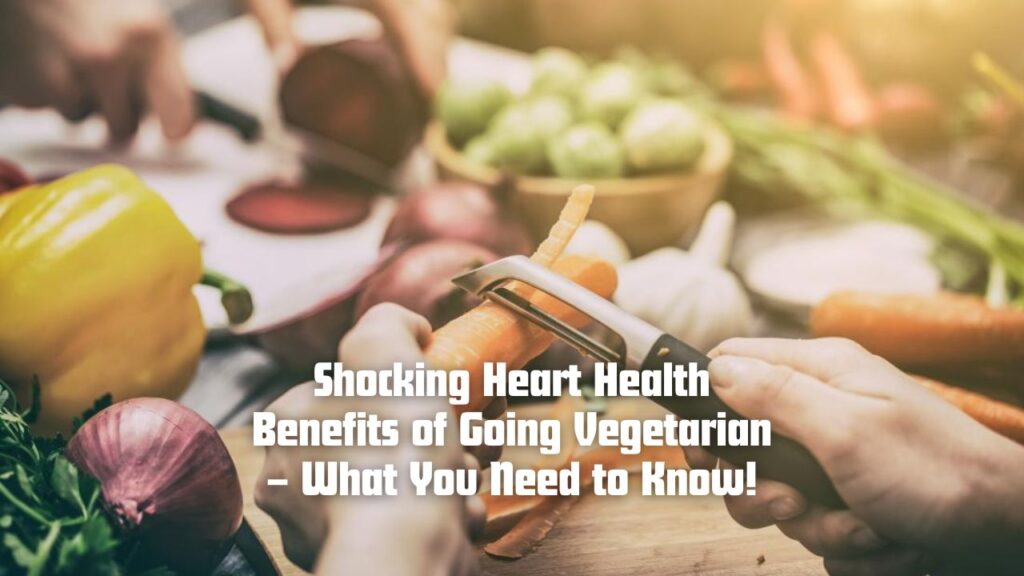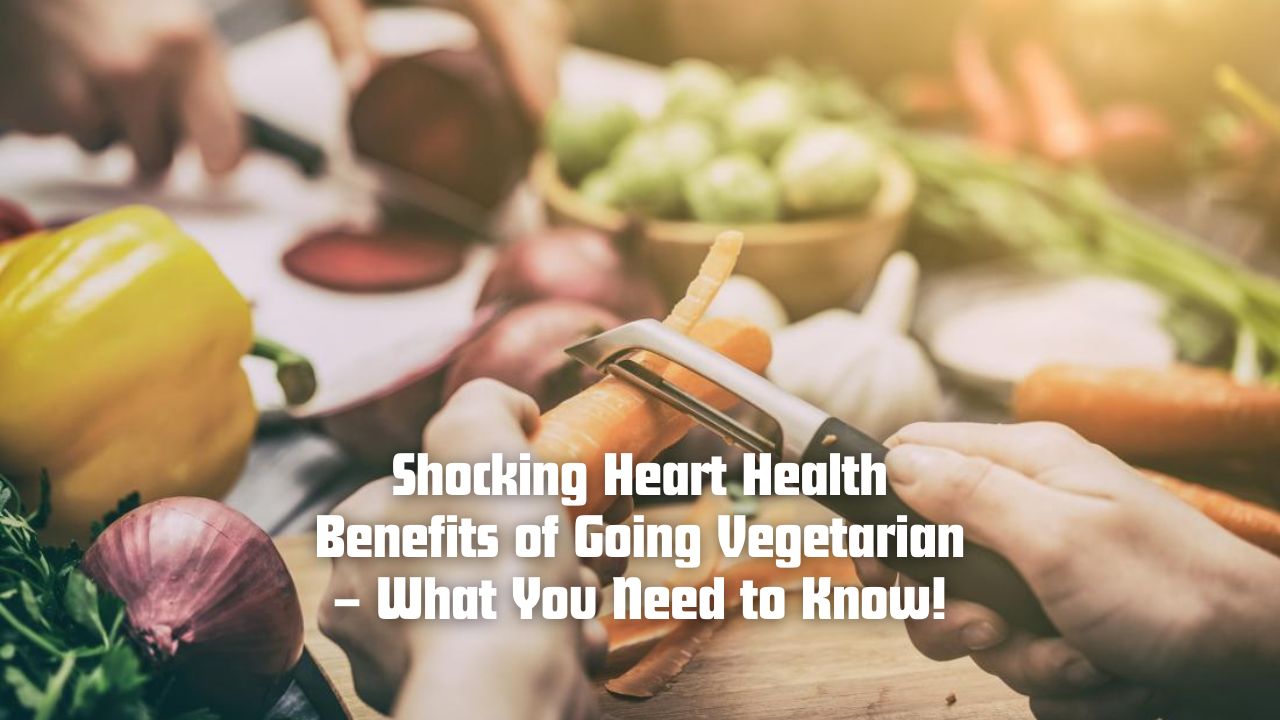Shocking Heart Health Benefits of Going Vegetarian – What You Need to Know!
Switching to a vegetarian diet is one of the most powerful choices you can make for your heart health. Many people think that eating meat is necessary for a healthy body, but research shows that vegetarians have lower risks of heart disease, high blood pressure, and cholesterol problems. In this article, we will explore the surprising ways a vegetarian diet can benefit your heart and improve your overall health.
1. Lowers the Risk of Heart Disease
One of the biggest reasons people choose a vegetarian diet is its heart health benefits. Studies have shown that vegetarians are less likely to develop heart disease than meat-eaters. This is because plant-based foods are low in saturated fat and high in fiber, which helps reduce bad cholesterol (LDL cholesterol).
A diet rich in fruits, vegetables, whole grains, nuts, and legumes keeps your arteries clear and improves blood circulation. This means your heart doesn’t have to work as hard to pump blood.
If you eat a lot of red meat and processed foods, you may increase your chances of heart attacks, strokes, and other heart-related problems. Reducing or eliminating meat from your diet can help you live longer and healthier.
2. Reduces High Blood Pressure
High blood pressure (hypertension) is a major risk factor for heart disease, stroke, and kidney failure. Many people take medications to control their blood pressure, but diet plays a big role too.
A vegetarian diet naturally lowers blood pressure because plant-based foods are low in sodium and high in potassium. Potassium helps balance sodium levels in your body, preventing high blood pressure.
Meat, especially processed meats like sausages and bacon, contains high amounts of sodium and unhealthy fats. These increase blood pressure and put extra strain on your heart and blood vessels. By switching to a vegetarian diet, you can lower your blood pressure naturally and reduce your need for medications.
3. Lowers Bad Cholesterol (LDL) and Increases Good Cholesterol (HDL)
Cholesterol is a fat-like substance that can block your arteries, leading to heart attacks and strokes. LDL (low-density lipoprotein) is the “bad” cholesterol, while HDL (high-density lipoprotein) is the “good” cholesterol.
Meat and dairy products contain high levels of saturated fats and cholesterol, which raise LDL levels. In contrast, plant-based foods contain healthy fats, such as those found in avocados, nuts, and olive oil, which increase HDL levels and keep your heart healthy.
By adopting a vegetarian diet, you help your body get rid of excess bad cholesterol and promote better heart function. This reduces the chances of heart disease, blocked arteries, and strokes.
4. Helps Maintain a Healthy Weight
Obesity is a major cause of heart disease, diabetes, and other health problems. Eating a diet rich in vegetables, fruits, and whole grains helps you maintain a healthy weight without strict dieting.
Plant-based foods are generally lower in calories and higher in fiber, which helps you feel fuller for longer. Unlike processed meats and fast foods, which are high in unhealthy fats and sugars, a vegetarian diet supports natural weight loss and reduces the risk of obesity-related heart problems.
Maintaining a healthy weight is also important for people with diabetes, as excess weight can lead to high blood sugar levels and insulin resistance. If you want to lose weight and protect your heart, switching to a vegetarian diet is a great choice.
5. Reduces Inflammation in the Body
Inflammation is linked to many chronic diseases, including heart disease, diabetes, and arthritis. Eating meat and processed foods increases inflammation in the body, leading to plaque buildup in the arteries and heart problems.
A vegetarian diet is rich in antioxidants, vitamins, and fiber, which help reduce inflammation and improve blood flow. Foods like berries, leafy greens, nuts, and seeds contain anti-inflammatory properties that protect your heart and blood vessels.
By eating plant-based foods, you can lower the levels of C-reactive protein (CRP), which is a marker of inflammation and heart disease risk. This means better heart health and a lower risk of chronic illnesses.
6. Prevents and Manages Diabetes
Diabetes is a major cause of heart disease and stroke. High blood sugar levels damage the blood vessels and nerves that control the heart. A vegetarian diet helps prevent and manage diabetes by improving insulin sensitivity and blood sugar levels.
Plant-based foods are rich in fiber, which slows down the absorption of sugar and prevents blood sugar spikes. In contrast, processed meats and high-fat dairy products can increase the risk of type 2 diabetes.
If you have diabetes or are at risk, switching to a vegetarian diet can help control your blood sugar and lower your risk of heart disease.

7. Strengthens Your Heart and Improves Blood Circulation
Your heart is a muscle, and like all muscles, it needs proper nutrition and care to stay strong. A vegetarian diet provides the essential vitamins, minerals, and antioxidants needed to keep your heart in top shape.
Eating plant-based foods improves blood circulation, lowers blood pressure, and prevents blockages in the arteries. This means your heart can pump blood efficiently, reducing the risk of heart failure, strokes, and other cardiovascular problems.
Exercise and a healthy diet go hand in hand when it comes to keeping your heart strong. By combining a vegetarian diet with regular physical activity, you can significantly improve your heart health and overall well-being.
8. Saves Money on Medical Bills and Health Insurance
Healthcare costs are rising, and medical bills related to heart disease, diabetes, and high blood pressure can be expensive. Many people spend thousands of dollars on medications, hospital visits, and insurance premiums.
Switching to a vegetarian diet can reduce your risk of serious health problems, helping you save money on healthcare expenses. Preventing chronic diseases through a healthy diet means fewer visits to the doctor, fewer prescriptions, and lower insurance costs.
In some cases, people can even reduce or eliminate their need for medications, further lowering their medical expenses. If you want to protect both your health and finances, going vegetarian is a great option.
9. Reduces the Risk of Heart Surgery and Medical Procedures
Heart disease can lead to serious medical procedures, such as bypass surgery, angioplasty, and stent placement. These treatments are not only risky but also very expensive.
By following a heart-healthy vegetarian diet, you can reduce your chances of developing blocked arteries and heart complications. This means a lower risk of needing costly medical procedures, saving you money and stress.
Insurance companies may charge higher premiums for people at risk of heart disease. By staying healthy, you can potentially lower your insurance costs and avoid the financial burden of major medical treatments.
10. Helps You Live Longer and Healthier
The ultimate benefit of a vegetarian diet is a longer, healthier life. People who follow plant-based diets tend to live longer and have fewer health problems compared to meat-eaters.
By reducing the risk of heart disease, high blood pressure, obesity, and diabetes, you can enjoy a better quality of life and spend more time with your loved ones. A healthy heart means more energy, fewer doctor visits, and a happier life.
If you’re looking for a way to improve your heart health, boost your energy levels, and save money on healthcare costs, switching to a vegetarian diet is one of the best choices you can make.
Final Thoughts – Should You Go Vegetarian?
The evidence is clear: going vegetarian can dramatically improve your heart health and overall well-being. By cutting out meat and focusing on nutrient-rich plant-based foods, you can lower your risk of heart disease, high blood pressure, and cholesterol problems.
If you’re not ready to go fully vegetarian, you can start by reducing meat consumption and increasing your intake of fruits, vegetables, whole grains, and nuts. Even small changes can make a big difference in your heart health.
So, are you ready to make the switch and protect your heart, health, and finances?
FAQs:
Switching to a vegetarian diet can be life-changing, especially when it comes to heart health. Many people have questions about how plant-based eating affects the heart, blood pressure, and overall well-being. Here are the top 10 frequently asked questions about the heart health benefits of going vegetarian.
1. How Does a Vegetarian Diet Improve Heart Health?
A vegetarian diet is low in saturated fat and cholesterol and high in fiber, which helps keep your arteries clear. Plant-based foods improve blood circulation, lower blood pressure, and reduce inflammation, all of which contribute to a healthier heart.
2. Can a Vegetarian Diet Lower High Blood Pressure?
Yes! Vegetarian diets are naturally low in sodium and high in potassium, which helps regulate blood pressure levels. Eating more fruits, vegetables, nuts, and whole grains can significantly lower hypertension risks and reduce the need for medications.
3. Does Cutting Out Meat Reduce the Risk of Heart Attacks?
Absolutely. Meat, especially red and processed meats, increases bad cholesterol (LDL), which can clog arteries and lead to heart attacks. A vegetarian diet helps lower LDL cholesterol and keeps blood vessels healthy, reducing the risk of heart attacks and strokes.
4. Can a Vegetarian Diet Help with Weight Loss?
Yes! Plant-based foods are lower in calories and high in fiber, keeping you full longer and preventing overeating. Maintaining a healthy weight reduces the risk of heart disease, diabetes, and high blood pressure.
5. What Nutrients Are Essential for a Heart-Healthy Vegetarian Diet?
Key nutrients include:
- Fiber (found in fruits, vegetables, and whole grains)
- Healthy fats (from nuts, seeds, and avocados)
- Omega-3 fatty acids (found in flaxseeds, walnuts, and chia seeds)
- Antioxidants (from berries, leafy greens, and nuts)
These nutrients support heart function and reduce inflammation.
6. Will I Get Enough Protein on a Vegetarian Diet?
Yes! Great plant-based protein sources include beans, lentils, tofu, quinoa, nuts, and seeds. These foods build muscle, boost metabolism, and keep your heart strong without the unhealthy fats found in meat and dairy products.
7. Does a Vegetarian Diet Lower Cholesterol Levels?
Yes. Meat and dairy products increase LDL (bad cholesterol), which leads to heart disease. Plant-based foods lower LDL cholesterol and raise HDL (good cholesterol), improving overall heart health.
8. Can a Vegetarian Diet Help Prevent Diabetes?
Yes! A vegetarian diet helps regulate blood sugar levels, making it easier to prevent and manage diabetes. Fiber-rich foods slow down sugar absorption, reducing insulin resistance and lowering the risk of type 2 diabetes.
9. How Soon Can I See Heart Health Benefits After Going Vegetarian?
Many people notice lower cholesterol and blood pressure within a few weeks. Over time, a vegetarian diet can lead to long-term heart health benefits, including reduced risk of heart attacks, strokes, and high blood pressure.
10. Can a Vegetarian Diet Save Me Money on Medical Bills and Insurance?
Yes! A healthy diet reduces the need for medications, doctor visits, and expensive treatments like heart surgery. Many people also qualify for lower health insurance premiums if they maintain a healthy lifestyle.
Final Thoughts
Switching to a vegetarian diet is one of the best decisions you can make for your heart, health, and finances. It lowers heart disease risks, improves blood circulation, and helps you maintain a healthy weight.
